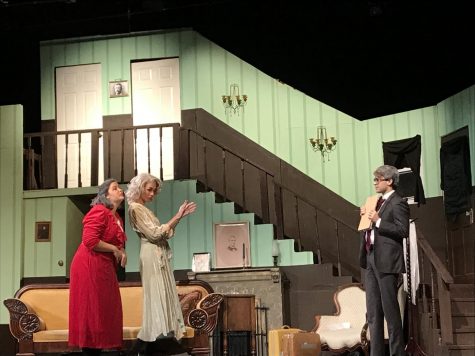Mirth and Murder in Mimes’ New “Arsenic”

By Emma Paolini
Murder may take center stage in Joseph Kesselring’s 1939 farce “Arsenic and Old Lace,” but the weekend of Nov. 8-11, the Mimes and Mummers gave the play new life.
“Arsenic” tells the story of the idiosyncratic Brewster family and the guests who visit them. At first glance, Aunts Martha (Kathryn Teaney, FCRH ’19) and Abby (Jack deBruin, FCRH ’22) seem like two harmless elderly Brooklyn ladies caring for their nephew Teddy, (Matt Schumacher, FCRH ’20) who truly believes he is President Teddy Roosevelt.
They also have a close relationship with Teddy’s brother Mortimer (Dylan Basalmo, FCRH ’22), a theatre critic who juggles his aunts’ antics and his relationship with his girlfriend, Elaine (Alex Mandalakis, FCRH ’20).
However, when Mortimer realizes his aunts have killed and buried elderly men in the basement — and Mortimer’s estranged older brother Jonathan (Ben Griffin, FCRH ’20) appears with sinister intentions and a wacky sidekick named Dr. Einstein (Mary Hurstell, FCRH ’21) — Mortimer worries his family’s mania may jeopardize his relationship with Elaine.
The over-the-top characters and hijinks characteristic of the farce shined in “Arsenic.” Energy seemed to burst from Collins Auditorium as the stakes increased, the story became more outlandish and the audience roared with laughter.
Basalmo’a portrayal of Mortimer played on the trope of the “only sane man” that Kesselring wrote into the story but with an increasing hysteria at the absurdity of his situation as the play approached its climax. Teaney and deBruin as the aunts remained serene throughout, a contrast with humor that transcends decades.
One of the most memorable moments of the play, however, occurred right at its end. To return to the stage for curtain call, characters came bursting through a window, four different doors, out of a window seat, downstairs and from the wings, a testament to the complexity of the set designed by Alex Guthrie, FCRH ’19.
Though nearly 80 years have passed since Kesselring first penned “Arsenic” and the references to 20th century popular culture may land differently, it is no surprise that this play still resonates. Now more than ever, it is easy to feel like the only sane person in a house full of madness, just as Mortimer does.
Still, Mortimer refuses to normalize his family’s outrageous behavior. Rather, he continuously points out the absurdity of their actions and goes to great (and occasionally hilarious) lengths to try to stop them.
Whether or not Mortimer is successful in his endeavors, the strength of the story lies in its ability not to take itself too seriously.
“Arsenic ” seems to exist in its own world with different rules, where some of the more serious and unusual subject matters make for the best comedy.
The cast’s camaraderie and the comedic instincts of director Richie Pepio made for a wacky and wonderful night of theatre. You might even say they killed it, and they did not need elderberry wine to do so.
